Dive Destinations
Liveaboards
Resorts / Day Trips
Scuba Training
World class wreck dives, healthy reefs, and varied and plentiful marine life, these are what attract so many scuba divers on Red Sea liveaboards year after year. And with competitive prices and so many liveaboard dive destinations in Egypt and Sudan to choose from, who can blame them?
You could spend a whole week diving with Red Sea liveaboards, exploring all the splendid wrecks in Egypt's northern region of the Red Sea, although this is not necessary since there is a world class marine park in the Sinai, and some current-rich dives that attract plenty of bigger fish. Further south are some offshore marine parks, famed for encounters with sharks, mantas and other pelagics. And the south of Egypt hosts the healthiest reefs in the country, set amongst a highly varied topography, including tunnels and caves.
Egypt's splendour extends beyond the underwater marvels of the Red Sea. Egypt combines liveaboard diving options with tours of cultural interest, making it an ideal vacation destination. Its historical attractions are world famous and include the ancient pyramids of Giza and Sphinx in Cairo, as well as Nile cruises and the Valley of the Kings near Luxor.
Of course, the Red Sea is not limited to just the territorial waters of Egypt. A great way to sample liveaboard diving here without the crowds is in the Sudanese waters.
We recommend a range of Red Sea liveaboards, including those with trips focusing on the northern regions in Egypt where you can dive numerous fantastic wrecks and those visiting southern area including the marine parks and beyond. Check out your Sudan and Egypt liveaboard options here:
Red Sea liveaboards in Egypt’s northern region mostly include premier wreck diving sites like the world-famous Thistlegorm, Rosalie Moeller, and Abu Nuhas wreck system, alongside reef and wall diving at Ras Mohammed National Park. Some shorter tours focus entirely on the sites of the Sinai Peninsula, from the Thistlegorm to Sharm El Sheikh and the Straits of Tiran. The sites are varied and the conditions tend to make for relatively easy scuba diving. Wreck enthusiasts and those who are relatively inexperienced tend to prefer the North & Wrecks trips. [More details on these dive sites: Hurghada, Sharm El Sheikh].
Most dive cruises in the Northern Red Sea are for a duration of 1 week, although shorter Sinai-only trips are also available.
> [More details: North & Wrecks Trips]Many liveaboards conduct tours of Egypt's Southern Red Sea, and some boats visit only this area exclusively. These cruise options may include the Brothers, considered to deliver some of the best diving that Egypt has to offer, as well as spots such as Daedalus Reef and Elphinstone, made famous for encounters with oceanic sharks. Further south are the exquisite reefs of St John's and the adventurous tunnel systems of the Fury Shoals. [More details on these dive sites: Southern Red Sea].
Conditions are more variable in the south, with reefs being more exposed, rougher seas, and occasional strong currents. Therefore Southern Red Sea cruises appeal to more experienced divers. Indeed divers must show proof of 50 logged dives before they can dive in the southern marine parks.
> [More details: Red Sea South Trips]Many divers in the Red Sea visit further south with increased experience, which is why for some, Sudan represents the ultimate Red Sea liveaboard diving destination. Not many boats go there, which is part of the attraction, and the scuba diving can deliver bigger schools of fish and healthier shark populations than areas further north. There are also some interesting wrecks, some of which are more technically challenging than beginners should experience, some fascinating caves and the unique sights of Cousteau's Conshelf II underwater living experiment. [More details on these dive sites: Sudan].
Liveaboard safaris depart either from Egypt's Port Ghalib or Port Sudan, making it easier to get to than you might think. There are also occasional longer charters. Diving here includes deep dives and wrecks, so Sudan is not a liveaboard destination for recently qualified scuba divers.
> [More details: Sudan Liveaboard Trips]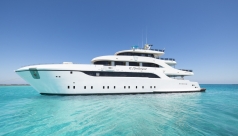
Customer rating: Excellent!

Customer rating: Very good!
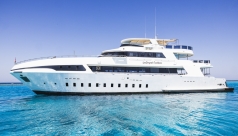
Customer rating: Very good!
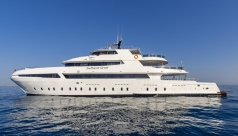
Customer rating: Good

Customer rating: Good

Customer rating: Be first to rate!

Customer rating: Be first to rate!

Customer rating: Be first to rate!
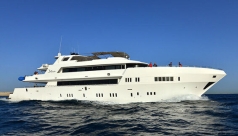
Customer rating: Excellent!

Customer rating: Excellent!

Customer rating: Excellent!

Customer rating: Excellent!

Customer rating: Excellent!

Customer rating: Excellent!

Customer rating: Excellent!
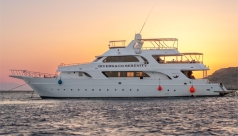
Customer rating: Excellent!

Customer rating: Excellent!

Customer rating: Very good!

Customer rating: Very good!

Customer rating: Very good!

Customer rating: Very good!

Customer rating: Very good!

Customer rating: Very good!

Customer rating: Very good!

Customer rating: Good

Customer rating: Good

Customer rating: Good
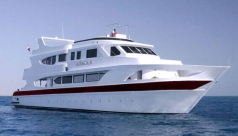
Customer rating: Good

Customer rating: Good
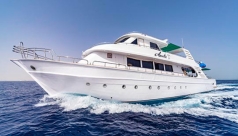
Customer rating: Good

Customer rating: Good
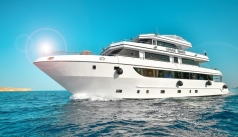
Customer rating: Good
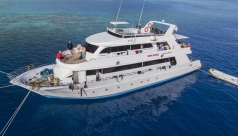
Customer rating: Good
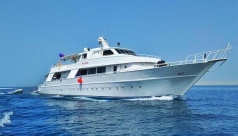
Customer rating: Average

Customer rating: Be first to rate!

Customer rating: Be first to rate!

Customer rating: Be first to rate!

Customer rating: Be first to rate!

Customer rating: Be first to rate!

Customer rating: Be first to rate!

Customer rating: Be first to rate!

Customer rating: Be first to rate!

Customer rating: Be first to rate!

Customer rating: Be first to rate!

Customer rating: Be first to rate!
Egypt has a desert climate where hot sunny days and cooler nights are the norm. Rain is an infrequent occurrence. It is wise to bring both some lightweight and warm clothing. There are 2 seasons in Egypt - summertime (24-42°C) is from June to November, and wintertime (20-29°C) is from December to May. Sudan follows a similar pattern but tends to remain a degree or two warmer.
The Red Sea is an all year liveaboard dive safari destination, with warmest water temperatures between June and August. However, the region is known for occasional strong winds which can blow at any time of year, but especially from October to April, so there is always a possibility that a cruise may need to be re-routed if it is unsafe to travel. Some of the bigger marine species are most frequently seen on a seasonal basis so it's best to consult our Egypt dive sites and Sudan dive sites pages for details on these.
Most visitors will arrive in Cairo and take a 1 hour domestic flight with Egypt Air to their port of departure, although some of the more popular ports such as Marsa Alam, Hurghada, Sharm el Sheikh, and Port Sudan have direct international flights too.
Ports are detailed for every trip in the 'Departure Schedule & Prices' section on each of our Red Sea liveaboard boat pages. They will also be sent to you during the inquiry and booking process. The departure and return ports can vary depending on the dates chosen. In some cases the boats are moored at port and depart the day after the trip begins, so you can arrive quite late on the first day of the tour and still board the boat before it departs the following morning.
Protect your diving adventure with specialised travel insurance covering both underwater activities and trip cancellations. Get a competitive quote through our recommended insurance program today:
For divers wanting to explore Egypt before or after their Red Sea liveaboard cruise, our partner HotelsCombined.com offers diverse accommodations from Cairo hotels to Red Sea resorts. Easily compare options, get instant help via live chat, and book securely - all backed by their 'Low Price Guarantee' for the best rates on your ideal stay:
Plan your perfect Red Sea dive trip with confidence using our FAQ page, packed with answers about conditions, logistics, and travel essentials.
